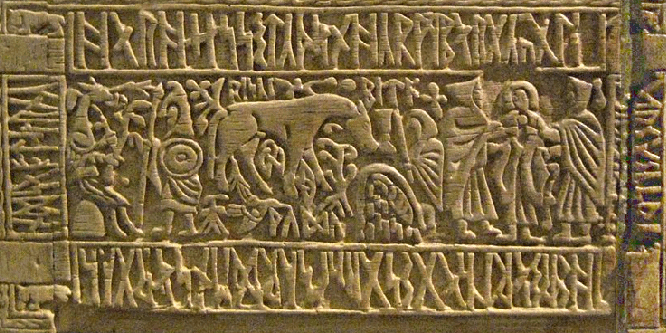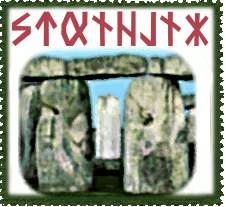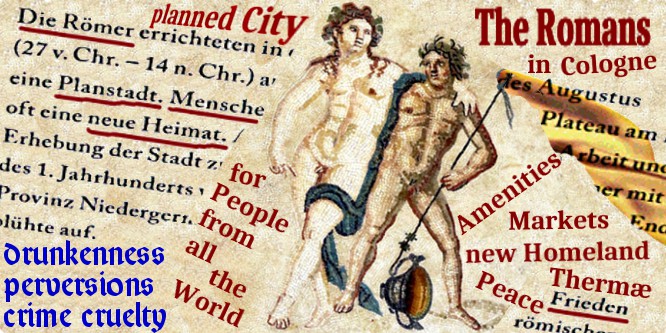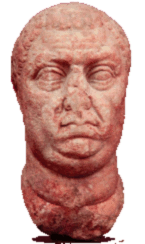9. Of Roman Civilisation, Misery and Burden Sharing
In modern times, the ruins and rests of all the
Roman glamour are liked and diligently preserved. Also many modern
buildings were designed in the classical way of the Græco-Roman
culture. So isn't this one achievement that the Romans introduced to
Britain, where before they were building huts only; made of wood,
wattle and mud? Such earthen huts however were much better adapted to
the climate of Britain, these would be cooler in summer and warmer in
winter. In the future era of the Earth Goddess, the few new buildings
will be constructed in futuristic designs and styles, people will fly
around with them. Then nobody will want to live in today's classical
buildings.
A popular modern saga about ancient Rome is
›Asterix‹. Diversity plays a big role in the Britain
episode. An Indian introduces tea to the British! That import is much
famed, but in truth the Brits who were drinking milk developed much
better. In that film we also see a cellar full of wine vats. That was
indeed the most liked import ware of the Romans. The Gaulish Celts
paid high sums for wine. In a popular British film about ancient Rome
called ›The Life of Brian‹, Jewish rebels reluctantly
fame the Roman roads. In real life though these roads served to
transport the legions fast to Judea, when Vespasian had decided to
kill or disperse the Jews and destroy their state. The Jews just
failed to accept that emperors like Caligula and Nero wanted to
become their new Roman gods. All the time they had held on to the
true Messiah of the future! But then Jesus had spoilt that spell of
luck of the Jews, and they had been massacred by the thousands in all
of the Roman empire. The problem that God has with the Jews is that
they are of an oriental race and of lower quality only. They also
burden God with the worse luck that such people naturally have.
One popular British book about ancient Rome is ›The
last Days of Pompeii‹ by Edward Bulwer-Lytton. I just remember
I red it many years ago, but I didn't really like the spectacular
scenes of disaster. The Vesuvius is not the only volcano of Italy.
And isn't it a pity that apparently nobody warned the inhabitants of
Pompeii, when that volcano suddenly spat out a pyroclastic stream, a
very fast moving stream of lava, ashes and gas? Such catastrophes are
diligently arranged by the Greys, and God often can't dare to
interfere. God just had and has too little influence in Italy.
There were just many too many people in Italy, and
these were reproducing fast. To worsen the situation, the old stupids
in togas had issued legislation that was supposed to make Romans have
more children. It was even regarded as a duty of Roman citizens to
marry, and there were social benefits for those who had three or four
children. Typical for the mentality of the Italians was that
eventually some guys received the legal status of guys with many
children, without having many children. One consequence however was
that bread, and other food, regularly was getting scarce. Even in
good years Rome more and more heavily relied on corn shipments from
North Africa. In bad years however famine became a massive problem.
At one time a hungry crowd threw bread crumbs at the goofy emperor
Claudius to make him act. Emperor Domitian then issued an edict to
make the land owners plant more corn instead of vines. He soon had to
take this legislation back due to biting criticism, since wine was
the holy beverage of the wine god Bacchus. And likewise thought the
Christians, since Jesus had recommended bread and wine as a sacred
meal. But still the Romans were so proud when some young British
started to adapt Roman civilisation and even wore the toga. That
simple traditional attire was okay in warm Italy, but Britain was
much cooler.
Rome was just so incredibly crowded and
overpopulated. A big fire had devastated it in the time of Nero; and
despite harsh measures to prevent fires, again a devastating fire
broke out under Titus. Rome often had to help Minor Asia, since there
so many bad earthquakes occurred. Then there were the epidemics. Once
the Germanic troopers of the guard of the Praetorians travelled to
Egypt, and came back gravely sick. One consequence of the traffic in
the Roman empire was the fast spreading of diseases and epidemics. In
the year when the emperor Domitian had been put down, more lightning
storms than ever before rattled the palaces and temples of the
Capitol in Rome. That must have encouraged his assassins in
superstitious Rome. Can it be that the gods wanted to see Domitian
dead, despite of the big new Jupiter temple that he had built right
there? The more energy you devote to the murky powers of the sky, the
more they win powers up there to do the evil things they like here.
Astrologers had foretold Domitian his assassination.
So many bad storms and big fires, famines,
epidemics, civic unrests and judicial crimes would always hit Rome!
The expansion of the Romans into the North also meant that these
Southerners shared their bad destiny with the Children of Light, who
are naturally, visibly more in the favour of Lady Luck; despite of
all the religious efforts of the Romans. It met the badness of the
sky that the Roman empire ended with a badly ruined Rome.
But what about the Roman peace? According to Julius
Caesar the British had been constantly at war with each others,
before he came to look, subdue and loot. Now this is what Diodor of
Sicily (5:21) wrote about Britain before the Roman invasion. The
historian criticised the housings of the British as bad, since these
were built from wood and straw. Nevertheless he famed them like this:
»Their mentality is honest. They are at a far
distance from the slyness and wickedness of modern humans. They have
simple food. They don't at all know the lush life that is a
consequence of being rich. The island is densely populated and lies
under a very rough sky... Kings and thanes plenty are there. They
mostly live in peace with each others.«
Many British apparently lived better and more free
lives before the Romans came. What we must add to the remarks of
Diodor is, that at times the British used to have a monarch for all
of Britain. That was one important element of the stability of
society, since it would help against the quarrels of feuding clans,
nobles, classes and cultures. We read in the ›Agricola‹
that the Silures reminded the British of their royal traditions.
According to the rules of the Berk-OS, the power to lead and govern
would naturally come to those tribes at the very centre of a region
with a distinct culture. That meant that the seat of the king of
Britain was supposed to be in the midland, maybe among the Brigantes.
So this must have been the reason why queen Cartimandus became so
influential.
The historian Strabo wrote that the British were
darker than the blond Gaulish but bigger, before the era of the Roman
occupation. At least some of them also seemed to be rather misshapen,
they were less well developed than the Gaulish. We may attribute this
to a rather unhealthy diet and a lazy lifestyle. According to this
Egyptian they were building their homes in the midst of forests. That
would indeed shelter them from the typical strong winds. While they
consumed milk plenty, some were so uncivilised that they did not know
how to make cheese. However, from the point of view of the health
lore of the UTR, cheese is indeed less recommendable since it mainly
consists of fat, and has degenerated and less valuable proteins only.
We must assume that the Druids, who were the philosophers and
teachers of the British as well as the Gaulish, sensed that there was
a problem with cheese. The same Druids also taught that it's better
to eat eggs only but not chicken.
The UTR teaches that the British had and have a
special burden to master, since closer fractal links exist between
them and the important cultures of planet Lar. A consequence of this
burden may be that eventually British grow up less well, and tend to
take up a less than sane lifestyle. Today some for instance easily
throw any food into the deep fat fryer, since they like fatty food.





 Again,
Cologne archaeologists claim that "people from all the world"
lived and worked in Roman Cologne. They can't be serious or can they?
Do they really mean that for instance Chinese coolies, or even Indios
from ancient America, came to found and build that splendid holy
Roman city? Surprise surprise, I found the authentic story of a
redskin from Cologne! Here it is, in excerpts from the text of Sueton
about the Roman emperor Vitellius:
Again,
Cologne archaeologists claim that "people from all the world"
lived and worked in Roman Cologne. They can't be serious or can they?
Do they really mean that for instance Chinese coolies, or even Indios
from ancient America, came to found and build that splendid holy
Roman city? Surprise surprise, I found the authentic story of a
redskin from Cologne! Here it is, in excerpts from the text of Sueton
about the Roman emperor Vitellius: